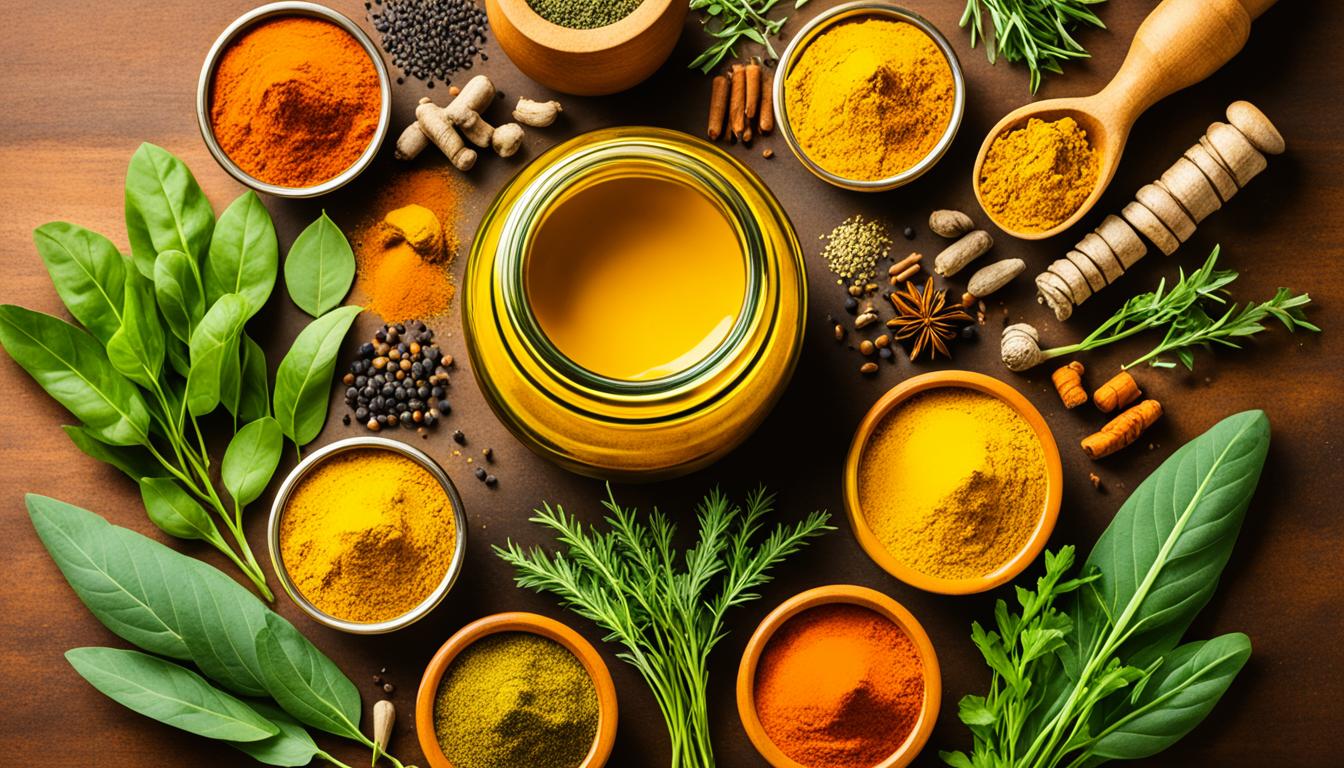Turmeric, with its deep, golden-orange hue, is more than just a flavorful spice. It has been celebrated for centuries for its numerous health benefits. If you’re looking to enhance your well-being, it’s time to explore the incredible uses of turmeric.
So, what exactly are the benefits of turmeric? This vibrant spice contains a natural compound called curcumin, renowned for its antioxidant and anti-inflammatory properties. By incorporating turmeric into your diet, you can effectively manage inflammation and experience a range of health benefits.
Among the many uses of turmeric, it has been found to be particularly beneficial for conditions such as arthritis, allergies, and infections. By harnessing the power of turmeric, you can support joint health, alleviate allergy symptoms, and even combat common infections.
While turmeric supplements are available, it is recommended to include turmeric in your meals rather than relying solely on supplements. By integrating turmeric into your cooking, you can enjoy its flavor while reaping its numerous health benefits. Plus, using turmeric in your meals allows for better absorption of curcumin by the body.
Ready to unlock the power of turmeric? In the following sections, we’ll delve into the science behind turmeric, provide tips for using this versatile spice, and explore how turmeric can benefit your overall health and well-being.
Whether you’re a seasoned turmeric enthusiast or new to its wonders, this comprehensive guide will equip you with the knowledge to make the most of turmeric’s incredible uses.
The Science Behind Turmeric
Numerous scientific studies have shown the extensive health benefits of turmeric and its active compound, curcumin. One significant finding is its potential to reduce joint pain in individuals with osteoarthritis, making it a promising natural remedy for arthritis.
Research has also explored the effects of turmeric on mood disorders, depression, and dementia. While the studies indicate positive outcomes, further research is still needed to confirm these benefits and determine the optimal dosage.
In addition to these conditions, turmeric has demonstrated potential benefits for managing metabolic syndrome, depression, and certain types of cancer. Its powerful anti-inflammatory properties make it effective for combatting inflammation-related ailments, including arthritis.
| Turmeric Health Benefits |
|---|
| Reduces joint pain in osteoarthritis |
| Potential positive effect on mood disorders, depression, and dementia |
| Possible benefits for metabolic syndrome, depression, and certain types of cancer |
| Effective in managing inflammatory conditions like arthritis |
While these studies highlight the potential benefits of turmeric, it is important to note that larger-scale studies are necessary to fully understand the extent of its health advantages.

By incorporating turmeric into your daily routine, you can harness its natural goodness and potentially experience the positive effects it offers. In the next section, we will explore practical tips on how to use turmeric in your cooking and skincare regimen.
Tips for Using Turmeric
Turmeric is a versatile spice that can be incorporated into your meals and skincare routine in various ways. Whether you want to add flavor to your dishes or enhance the health of your skin, turmeric has got you covered.
- For Cooking: Turmeric is a staple in Indian cuisine and can be used as a spice in curries, soups, stews, and more. To maximize its benefits, try combining turmeric with black pepper as it can enhance the absorption of its active compounds. This combination not only adds flavor but also boosts the bioavailability of turmeric in your body.
- For Skincare: Turmeric possesses natural antimicrobial properties that can be beneficial for your skin. It may help with conditions like acne, eczema, and psoriasis. However, keep in mind that turmeric can stain surfaces, so take precautions when using it topically. You can create a turmeric face mask by combining it with ingredients like honey and yogurt for a soothing and rejuvenating effect.
- Turmeric Tea: Another popular way to enjoy turmeric is by making turmeric tea. You can brew it with hot water and add a squeeze of lemon and a drizzle of honey to taste. This warm and comforting beverage is not only delicious but also helps you reap the benefits of turmeric.
Get creative with turmeric and explore its diverse uses in your culinary endeavors and skincare routine. Just remember to embrace the vibrant color and distinct flavor that turmeric brings to your life.

Did You Know?
“Turmeric has long been used in Ayurvedic medicine for its healing properties and is an essential herb in Indian cuisine.”
Conclusion
When it comes to reaping the benefits of turmeric, incorporating it into your diet through food is generally recommended over relying solely on supplements. Consuming turmeric with black pepper and healthy fats can enhance the bioavailability of curcumin, the active ingredient in turmeric, allowing your body to absorb it more effectively.
It is important to exercise caution when considering turmeric supplements, especially in high doses. These supplements can interact with certain medications and may have potential side effects. To ensure your safety and well-being, it is best to consult with your healthcare provider before adding any new supplements to your routine.
Turmeric tea is a simple and enjoyable way to include turmeric in your daily routine. You can customize your turmeric tea by adding ingredients like lemon and honey to enhance its flavor. This warm and soothing beverage not only provides the health benefits of turmeric but also offers a delightful taste experience.
Unlocking the power of turmeric uses can contribute to enhancing your overall health and well-being. By incorporating this vibrant spice into your meals and enjoying a soothing cup of turmeric tea, you can harness the potential benefits of turmeric and embark on a journey towards a healthier lifestyle.
FAQ
What are the benefits of turmeric?
Turmeric has numerous benefits, including its anti-inflammatory properties, ability to manage conditions like arthritis and allergies, and potential benefits for metabolic syndrome, depression, and certain types of cancer.
How can I use turmeric in my meals?
Turmeric can be used as a spice in curries, added to soups and stews, and even brewed into teas. Combining turmeric with black pepper enhances its absorption in the body.
Can turmeric be used for skincare?
Yes, turmeric can be used topically to promote healthy skin. It has antimicrobial effects and may help with conditions such as acne, eczema, and psoriasis. However, be cautious as turmeric can stain countertops and fabric.
Should I take turmeric supplements?
While turmeric supplements are available, it is generally recommended to incorporate turmeric into your diet through food rather than relying solely on supplements. Curcumin supplements may interact with certain medications and can have side effects, so it is best to consult with your healthcare provider before starting them.
How can I make turmeric tea?
Turmeric tea can be made by combining turmeric powder with hot water and adding ingredients like lemon and honey for taste. It can be enjoyed warm or cold.
Source Links
- https://www.webmd.com/diet/supplement-guide-turmeric
- https://www.health.com/turmeric-7552907
- https://www.hopkinsmedicine.org/health/wellness-and-prevention/turmeric-benefits

